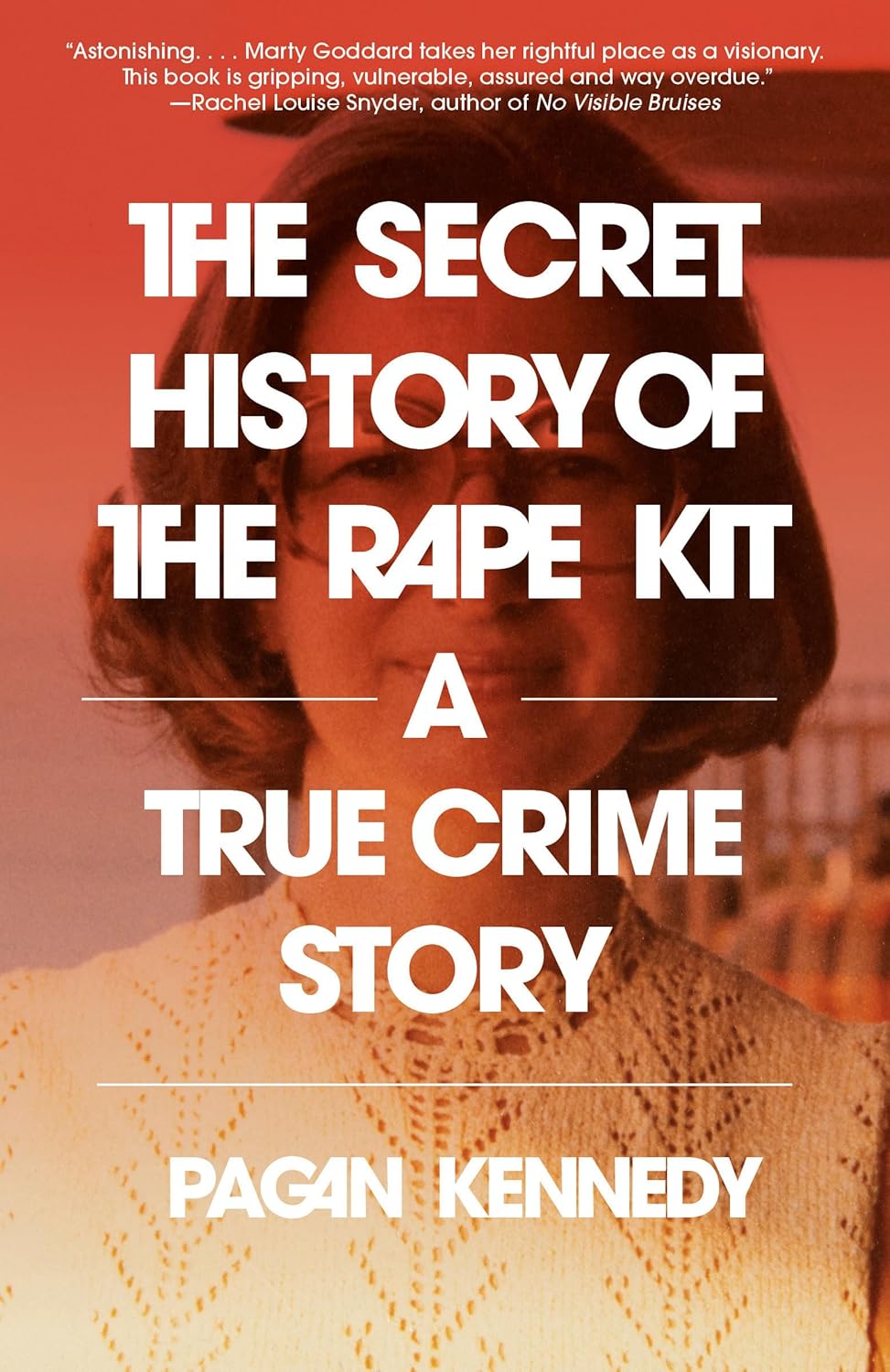The Secret History of the Rape Kit: A True Crime Story
- By Pagan Kennedy
- Vintage
- 256 pp.
- Reviewed by Cara Tallo
- January 9, 2025
Why did trailblazer Marty Goddard get no credit for her own invention?

Martha, Martha, Martha.
Many women may not have heard the specifics of your story, but I’m betting as they read this book, the broad strokes will feel awfully familiar:
Shouting into the void about the injustice of patriarchal oppression? Check.
Working to make change until your body breaks? Check.
Watching a man collect commendations for your effort? Check.
In The Secret History of the Rape Kit, author Pagan Kennedy crafts a nonfiction narrative about the life and work of Martha “Marty” Goddard, the feminist activist who conceived of the evidence-gathering protocol colloquially referred to as the “rape kit.” By the time Goddard realized the justice system lacked a method for treating sexual assault as an actual crime, she was a 31-year-old divorcée volunteering at a crisis hotline for teens in Chicago.
Contrary to the media narrative at the time, Goddard found herself fielding calls from girls who were running for their lives, often fleeing physical and sexual abuse in their own homes. But like the media, police dismissed their claims. A Chicago police training manual from 1973 instructed that “many rape claims are not legitimate” and that women often made allegations of sexual abuse to take revenge on “an unfaithful lover or boyfriend with a roving eye.”
Goddard wasn’t the type to march down to city hall and demand change; she knew her strengths and understood the limitations of the culture in which she existed. Instead, she leveraged the gender ambiguity of her nickname and the gravitas of her position at the progressive Wieboldt Foundation to open doors that might’ve otherwise been closed.
She sat in on victim-support groups, spoke with hospital supervisors, and interviewed staff at the Chicago Police Department’s Crime Lab. She observed and listened. She discovered that police could choose to throw out evidence or refuse to collect it at all, and that even when there were signs of a violent assault, “the opinions of the police officers often mattered far more than the evidence itself.” This all made Goddard wonder: What would happen “if sexual assault could be investigated and prosecuted like a murder or a robbery?”
Goddard approached a Chicago P.D. contact, Sergeant Louis Vitullo, with her idea for an evidence-collection template that could be widely distributed to law enforcement and hospitals. According to a friend of Goddard’s, Vitullo shouted her out of his office. She was infringing on his territory. He was livid. But a few days later, he called Goddard back to his office and presented her with a full model of the kit she’d described.
There are different accounts of why Vitullo’s name — not Goddard’s — is associated with the kit, but the way Goddard’s friend tells it, Goddard “thought the only way forward was to present her vision as a collaboration between the state’s attorney’s office and the police department, making it clear that men would be in charge.” In 1978, at the helm of a new nonprofit she’d founded for victims of sexual abuse, Goddard filed a trademark application for the “Vitullo Evidence Collection Kit.”
This is the mistake we make, Martha. We want to enact change so badly, we choose pragmatism over praise every time. But it takes a toll.
Chicago became the first city to widely distribute the kit to emergency responders. Goddard carefully managed the training for everyone who would handle her kit, ensuring they understood this fundamentally new approach not only to evidence collection, but to sexual-assault victims. Then, in the 1980s, Goddard unraveled. She suffered her own trauma, self-medicated with work and alcohol, and slowly disappeared from the public space. By the time author Kennedy, on her own journey to find the source of the rape kit’s creation, determined Goddard’s last known location, Goddard was dead. There was no obituary; friends from her activist days had no idea she’d passed.
Through this book, Kennedy highlights the progress enabled by Goddard’s unsung efforts, namely the wholesale evolution of forensic science that can now link microscopic DNA evidence to a vast network of potential perpetrators. But her chronology can feel a bit manic, jumping from the 1800s to the 1900s to the 1600s in the span of a few pages. Further complicating the timeline, Kennedy weaves her own trauma experience into the narrative, an effort I assume is meant to underscore how little feminist activism has actually changed society.
Near the end of the book, Kennedy introduces a few women continuing Goddard’s work by trying to distribute rape kits that allow victims to collect evidence in the privacy of their homes. When one of them expresses surprise at the controversy surrounding these kits even in the 2010s, Kennedy reflects:
“[S]he had discovered that you can’t have it both ways. You can’t be an insider and an activist reformer. Once you push too hard against the system, it will spit you out.”
But you already knew that, didn’t you, Martha?
Cara Tallo is the former executive producer of NPR’s “All Things Considered,” “Invisibilia,” and “Morning Edition.” She’s currently pursuing her MFA at American University while freelancing at MakingitWork.io.
.png)
